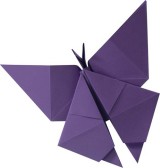Find out what goes on in Steve Mills’ classroom, Teaching Award winner 2009...
TP: What’s your favourite maths lesson?
SM: It’s a way of teaching aspects of shape, measurement and area, using modular origami. I was looking for something new and inspiring, and a colleague of mine who teaches here mentioned that she had a friend who is a maths AST, and was doing a project on this technique. I arranged for him to come in and spend half an hour with me, during which he showed me three or four wonderful little constructions, with so much potential for mathematical exploration and questioning.
TP: So how do you get the pupils engaged?
SM: It’s very much a ‘doing’ lesson. Everyone has paper and we all do the construction together – it’s not a case of me demonstrating as they watch. And the whole time, we’re talking, discussing and questioning: what shape is the paper now? We’ve halved the length – what do you think that will do to the area? Why don’t these triangles fit together the same way? How could we work out the volume of the box we’ve just made? It reaches out to pupils across the board; you’re bringing in the visual and kinaesthetic learners along with the auditory ones – and it’s true, too, that some children simply seem to absorb information better when they’re able to ‘fiddle’ as they listen, rather than focus exclusively on the teacher. The absolute best bit of equipment is the visualiser, which enables everyone to see what I’m doing and follow the construction – the lesson would be much less effective without it.
 TP: What next?
TP: What next?
SM: The brilliant thing about this kind of origami is the way the individual constructions fit together to make larger, more complex shapes, which open up the discussion even further. For example, one of the models is a triangular based pyramid, but with the top removed (a frustum). With 20 of these you can create an icosahedron – one of the five Platonic solids. And, perhaps more excitingly for KS1/2 pupils, with three of them in ascending sizes, made of green and red paper, plus a chocolate or two, you can fashion a 3-D interactive Christmas card!
TP: Whose idea was that?
SM: It came about through playing with the shapes – I think I’d happened to make some out of green paper, and was putting them together, when one of the pupils observed that it looked like a Christmas tree. The design for the card evolved through discussion, and it made for an enjoyable cross-curricular linked lesson later on in the year.
Steve Mills is assistant headteacher at William Ransom Primary School, Hitchin, Hertfordshire
Did you always want to be a primary school teacher?
Steve Mills: Actually, no! At university, I specialised in maths and PE, and always saw myself teaching at secondary level. However, my first ever practice placement was with a Y5 group in Coventry, and I came out realising that, although I loved my specialist subjects, I really enjoyed the wider scope of primary teaching. It’s fun to find out about the Tudors, or Judaism – and to teach children who are so enthused about what we’re doing.
Your school’s record of sporting achievement is impressive – What’s the secret?
SM: It’s the same as with any aspect of teaching: if you expect children to do well, then as a rule, they won’t let you down. And if you treat them as professionals, they act professionally. We do have high expectations of our pupils – but they’re supported by our belief in them, rather than burdened by pressure to succeed.
At the risk of sounding clichéd – it’s the variety. Every cohort is different, and although you’re covering similar things each year, you have to tweak your teaching in order to get the best out of each individual pupil.
It’s the downside of ‘what’s good’, really; despite the fact that every pupil and every year group is different, it seems that ‘success’ is to be measured with no regard for this whatsoever. Targets are set based on exceeding the achievements of the previous year – it’s nonsensical. I know there has to be accountability – but there should be trust in the professional educators, too.
How to be a singing school
Ace-Music
How to use modelling to engage pupils with autism
Ace-Art-And-Design
